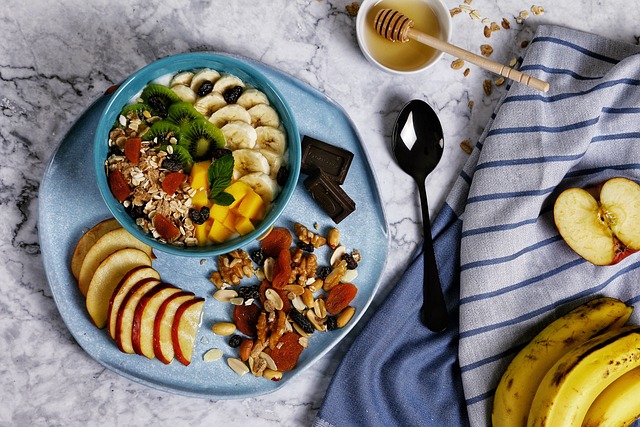As the evening comes to a close and you prepare to retire for the night, your stomach remains alert. You now contemplate whether or not to indulge in a snack before bed. Confronted by the refrigerator, you are likely to question the credibility of information surrounding post-dinner eating.
It is commonly advised to resist the urge to eat at night. This is because consuming food after sundown is believed to contribute to inconvenient weight gain, interfere with good sleep and compromise overall health.
If you happen to feel truly hungry during nighttime despite doing extensive workouts, should you endure it until the next morning? Also, if it is acceptable, what are the most suitable foods to consume at that specific time?
Late-Night Snacking Pros and Cons
Our habits of consuming nutritionally questionable food items at night do not aid our health and wellbeing. The study presented at the 2020 European and International Conference on Obesity revealed that individuals who eat late at night consume 40% of their total daily calories after 6 p.m.
In addition to that, people who consume snacks generally tend to consume lower quality calories compared to those who eat more at the start of the day. These snacks usually contain high levels of sugar and fat and are deficient in protein and fiber. Therefore, it is not the act of snacking that is problematic, but rather the type of snack that can have negative consequences.
Despite the convincing evidence presented in this study to support the idea of closing the kitchen post-dinner and refraining from indulging in sweets, nobody desires to retire to bed with an empty stomach.
Athletes with higher calorie and nutrient requirements can optimize their nutrition through a well-planned nighttime snack. It should be acknowledged that the majority of studies on late-night eating have been done on the general populace, including those with obesity, rather than on physically active runners. However, when late-night eating coincides with regular exercise, any unfavorable consequences are likely to be lessened.
In addition, opting for nutrient-dense, lower-calorie foods instead of the usual snacks that are high in calories such as pastries and salty chips can prevent the negative consequences linked to snacking at night. Providing essential nutrients before bedtime can also result in favorable physiological changes that enhance health and performance.
1. Weight Loss
While you sleep, your body requires energy to operate as it recuperates from the previous day.
If you go to bed without eating anything, your body won’t have enough calories to recharge itself. In turn, your body will start hoarding fats and carbs instead of using them for energy. It’s beneficial to opt for snacks that are rich in melatonin and tryptophan, as they can help you feel full and also provide your body with the energy it requires to recover during the night.
2. Tryptophan
Consuming tryptophan-rich foods such as milk, cheese, eggs, nuts, fish, and beans can help induce sleep. This is because tryptophan, an amino acid that boosts serotonin and melatonin levels in the body, cannot be naturally produced by us.
3. Melatonin
The body’s sleep-wake cycle is regulated by melatonin, a hormone that is affected by the absence of light. Melatonin production is directly associated with the body’s exposure to light, with lightless conditions resulting in a higher melatonin secretion. Cherries, walnuts, bananas, oats, and tomatoes are all effective sources of this hormone.
4. Sleep Better
Eating until one is full can induce drowsiness, however consuming nutritious foods can be the determining factor in whether one has a restful night or experiences stomach discomfort. Snacks that are healthy such as apples with peanut butter or avocado toast are abundant with beneficial nutrients.
5. Maintain Blood Sugar
Blood sugar levels are regulated by foods such as fruits, nuts, oatmeal, and whole wheat bread. When levels are low, it can lead to reduced energy and feeling sluggish the following morning. Conversely, high levels can trigger bursts of energy, leading to disrupted sleep.
Cons of Eating Before Bed
Possible rephrased text: There are several downsides to having a meal or snack before going to bed, such as impairing your sleep quality, decreasing your metabolic rate, increasing your calorie intake, promoting unhealthy food preferences, triggering acid regurgitation, causing stomach discomfort, and raising your health hazards.
6. Poor Sleep
Your sleep patterns can be disrupted based on the type of food you consume and the time of day you consume it. Even though chocolate and coffee may appear to be good options before bed, their caffeine content could increase your energy levels and result in frequent wake-ups during the night.
7. Slower Metabolism
Consuming food, particularly those high in carbohydrates, before going to bed can hamper the digestion process and result in weight gain as the body slows down its functioning at night to prepare for sleep.
8. Meal Size
Consuming larger meals is common at night when hunger pangs are strongest. To allow for proper digestion, it is advisable to avoid eating late at night and try training oneself to have bigger meals during the day instead. The saying “Eat breakfast like a king, lunch like a prince, and dinner like a pauper” is a valuable recommendation, particularly when attempting to shed some pounds.
9. Unhealthy Choices
Late-night snacking poses a significant challenge due to the choices we make. We tend to surrender to our yearnings for unhealthy, high-fat, and sweet junk foods such as crisps, pizza, biscuits, and ice cream. These types of snacks can lead to excessive eating, especially when consumed while watching television, resulting in mindless overeating.
10. Acid Reflux, Indigestion, and Heartburn
Eating substantial meals before going to bed may lead to acid reflux, indigestion, and heartburn. Allowing time for digestion before bedtime can lower the chances of experiencing these issues. When one lies down after consuming food, the body is in a horizontal position, making it effortless for stomach acid to enter the esophagus, and cause acid reflux.
Indigestion occurs when a person experiences stomach pain and discomfort following a sizeable meal, while heartburn results from overeating or consuming spicy dishes and causes a burning feeling in the chest. Heartburn symptoms can be aggravated when a person lies down.
11. Worsens Sleep Apnea
If you are already finding it difficult to manage the symptoms of sleep apnea, consuming food late at night can amplify the frequency of interruptions in your sleep. According to a study conducted in 2019, participants who consumed large amounts of food near bedtime experienced a higher number of awakenings.
Health Risks
Regularly consuming meals in the evening hours can lead to health hazards such as, obesity, diabetes, and heart problems.
Obesity and Weight Gain
Overconsumption of calories leading to the storage of excess fat is a contributing factor to weight gain and obesity. Foods that are high in calories, such as fast food, fried food, fatty meats, and sugary snacks, result in weight gain at any time of the day.
Diabetes
Diabetes refers to the condition wherein an individual experiences increased blood sugar levels due to the inability of the body to produce enough insulin or utilize it effectively for regulating blood sugar.
Heart Disease
Heart disease encompasses various conditions that impact the heart, which may comprise heart malformations, hypertension, and irregular heartbeats. Partaking in an unhealthy diet, specifically during late-night hours, can constrict and obstruct the arteries with fatty substances, commonly denoted as plaque.
Night-Time Snacking Guidelines
To establish a healthier habit of snacking after sunset, it is essential to determine the reason behind your urge to snack. If you have engaged in intense training or accomplished an exceptionally challenging workout that day and are genuinely hungry after having dinner, then indulge in a snack.
It’s possible that during dinner, you may reach your limit for the amount of food you can consume and your body’s hunger signals may indicate a need for additional nutrition. If you are waking up hungry at night or feeling even more tired the following day, it may be helpful to establish a healthy bedtime snack routine.
If you find yourself consuming more calories while inactive at night out of boredom or due to emotional factors like stress or anxiety caused by the pandemic, it is crucial to investigate the cause of your kitchen visits and develop a strategy for controlling them.
To manage cravings linked to boredom or stress, participating in other activities such as taking a walk or listening to an audiobook can be helpful. Drinking herbal tea could relieve dehydration that might be mistaken for hunger.
If you find yourself snacking at night, it could indicate a deficiency in your diet. To reduce nocturnal cravings, ensure you consume sufficient amounts of fiber and protein during the day to maintain stable blood sugar levels. Research shows that higher protein intake earlier in the day is linked to reduced nighttime snacking urges.
2. Be mindful
It’s important to evaluate your nighttime snacks to see if they might be causing you to exceed your total daily calorie count and obstructing your efforts to meet your fitness and health objectives. Many individuals neglect to recognize the high levels of calories, sugar, and fat present in their snacks.
Knowing what you consume is crucial for determining where adjustments can be made. For example, your late snack could have the same amount of calories on days you train and days you don’t, which might not be beneficial. Being savvy about late-night snacking can help you thwart any harmful consequences.
Take stock of the food you’ve consumed throughout the day and identify what nutrients you may require more of. Incorporate those into your snack.
If you have been doing cardio or strength training, it would be advantageous to add more protein to your evening snack for muscle recovery. In case you missed out on including some whole-grain carbs in your dinner for post-workout glycogen replenishment, having something like toast before going to bed could prove to be helpful.
4. Keep it simple
By selecting healthier options like snacks based on whole foods with shorter ingredient lists such as plain Greek yogurt with berries, whole-grain crackers with natural peanut butter, hummus with bell pepper strips, or a handful of nuts with fruits, you can prevent most of the unfavorable consequences associated with eating after 8 p.m.
If you consume a mixture of protein, fiber, and healthy fats, your digestion will slow down and your blood sugar levels will not rise quickly, thereby keeping you full for a longer duration.
The most effective way for people to improve their snacking decisions is to avoid keeping unhealthy foods in the kitchen. It’s important to keep in mind that exercise alone cannot compensate for a poor diet. Additionally, snacks should not be treated as full meals. Unless you are engaging in daily marathon running, it’s recommended to limit late-night snack consumption to approximately 250 calories.
5. Know when to push back
Consuming food late at night, specifically after dinner, may lower the quality of sleep and lead to excessive fat storage in some people. Hence, if you are opting for healthy snacks but still experiencing negative effects, it could indicate that your body operates optimally when calories are consumed earlier in the day and you avoid nighttime snacking.
Foods to Avoid at Bedtime
Consuming acidic, fried, spicy, and fatty foods can cause discomfort in the stomach, especially if you lie down right after eating. Similarly, sugary foods have an impact on the quality of your sleep, hence it is advisable to eliminate junk and sweet food from your diet.
When it’s close to bedtime, it’s best to avoid consuming caffeine. This includes staying away from coffee, soda with caffeine, and strong black or green tea. Even decaffeinated tea still has some caffeine in it, so choosing herbal tea is the way to go if you want to completely eliminate caffeine for better sleep.
Best Time to Eat
It is recommended to have dinner three hours prior to sleeping so that the stomach can digest effectively and prepare for the forthcoming sleep. Consuming modest quantities of foods that consist of complex carbohydrates, fruits, vegetables, or a limited quantity of protein can alleviate hunger pangs and expedite the onset of sleep.
As part of your bedtime routine, you may relax for a few hours after dinner by engaging in activities such as taking a warm shower or bath, reading a captivating book, reflecting on your day in a journal, or solving a jigsaw puzzle.
If you experience hunger nearing bedtime, you may want to opt for a nutritious and low-calorie late-night snack such as some yogurt or a few nuts.



